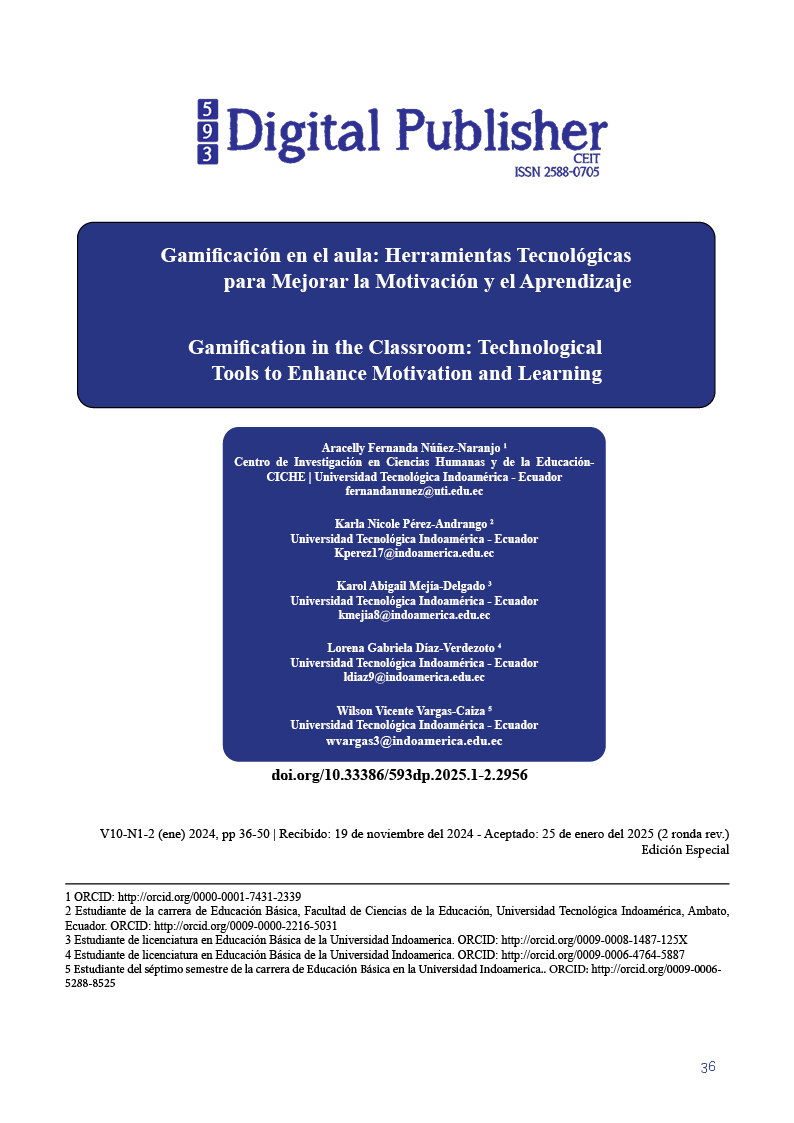Gamificación en el aula: Herramientas Tecnológicas para Mejorar la Motivación y el Aprendizaje
Contenido principal del artículo
Resumen
Introducción: La gamificación se concibe como una estrategia innovadora que transforma el proceso educativo al integrar dinámicas de juego en contextos no lúdicos, esto responde a las demandas de una sociedad en constante cambio, garantiza una educación inclusiva y equitativa, enriquece las experiencias de aprendizaje promoviendo la participación activa, se utilizan elementos como recompensas, niveles y clasificaciones para captar la atención de los estudiantes y mantenerlos enfocados. Objetivo: El objetivo es analizar el impacto de la gamificación en el aula mediante el uso de recursos tecnológicos, buscando identificar cómo estas estrategias pueden mejorar la motivación y el aprendizaje de los estudiantes. Metodología: La metodología empleada presenta un enfoque cualitativo, con un diseño descriptivo y analítico, se realizó una revisión sistemática de literatura académica sobre la implementación de la gamificación en la educación. Resultados: Los resultados obtenidos a partir de esta investigación no solo contribuyen a la literatura existente, también favorecen significativamente a la mejora de la motivación y la participación estudiantil promoviendo inclusión y equidad educativa en contextos digitales y de diversas necesidades. Conclusión: En conclusión, se resalta que la gamificación potencia el aprendizaje al transformar tareas monótonas en experiencias dinámicas. Su implementación requiere creatividad y planificación para garantizar su eficacia y evitar desmotivaciones.
Descargas
Detalles del artículo

Esta obra está bajo una licencia internacional Creative Commons Atribución-NoComercial-CompartirIgual 4.0.
1. Derechos de autor
Las obras que se publican en 593 Digital Publisher CEIT están sujetas a los siguientes términos:
1.1. 593 Digital Publisher CEIT, conserva los derechos patrimoniales (copyright) de las obras publicadas, favorece y permite la reutilización de las mismas bajo la licencia Licencia Creative Commons 4.0 de Reconocimiento-NoComercial-CompartirIgual 4.0, por lo cual se pueden copiar, usar, difundir, transmitir y exponer públicamente, siempre que:
1.1.a. Se cite la autoría y fuente original de su publicación (revista, editorial, URL).
1.1.b. No se usen para fines comerciales u onerosos.
1.1.c. Se mencione la existencia y especificaciones de esta licencia de uso.
Citas
Acurio Ponce, B., & Nuñez Naranjo, A. (2019). Creo, juego y aprendo con estrategias y recursos para mejorar la comprensión lectora. 593 Digital Publisher CEIT, ISSN-e 2588-0705, Vol. 4, No. 2, 2019 (Ejemplar Dedicado a: Education), Págs. 44-59, 4(2), 44–59. https://dialnet.unirioja.es/servlet/articulo?codigo=7144029&info=resumen&idioma=SPA
Adell, F. L., Castillo, I., Álvarez, O., & Tomás, I. (2019). Valores personales en el baloncesto de formación y su relación con el bienestar y la intención futura de práctica a través de la motivación. Cuadernos de Psicología Del Deporte, 19(2), 227–242. https://doi.org/10.6018/cpd.363331
Agbenorxevi, C. D., Hevi, S. S., Malcalm, E., Akude, J., & Coleman, R. K. N. (2023). Gamified Problem Gambling and Psychological Distress: The Mediated-Moderated Roles of Cognitive and Economic Motives. Journal of Gambling Studies, 39(3), 1355–1370. https://doi.org/10.1007/s10899-023-10219-w
Alamri, I. K. A. (2025). Gameful learning investigating the impact of game elements, interactivity, and learning style on student success. Multidisciplinary Science Journal, 7(3). https://doi.org/10.31893/MULTISCIENCE.2025108
Aldalur, I. (2024). Gamifying software engineering subject to enhance the quality of knowledge. Software: Practice and Experience, 54(12), 2299–2315. https://doi.org/10.1002/SPE.3339
Baah, C., Govender, I., & Subramaniam, P. R. (2024). Enhancing Learning Engagement: A Study on Gamification’s Influence on Motivation and Cognitive Load. Education Sciences 2024, Vol. 14, Page 1115, 14(10), 1115. https://doi.org/10.3390/EDUCSCI14101115
Barata, G., Gama, S., Fonseca, M. J., & Gonçalves, D. (2013). Improving student creativity with gamification and virtual worlds. ACM International Conference Proceeding Series, 95–98. https://doi.org/10.1145/2583008.2583023
Berrones Yaulema, L. P., Espinoza Tinoco, L. M., Congacha Ausha, A. E., & Moyano Guamán, M. A. (2023). La gamificación en el aprendizaje significativo de las asignaturas de educación básica. Polo Del Conocimiento: Revista Científico - Profesional, ISSN-e 2550-682X, Vol. 8, No. 7 (JULIO 2023), 2023, Págs. 240-262, 8(7), 240–262. https://dialnet.unirioja.es/servlet/articulo?codigo=9234519&info=resumen&idioma=ENG
Boccoli, G., Tims, M., Gastaldi, L., & Corso, M. (2024). The psychological experience of flexibility in the workplace: How psychological job control and boundary control profiles relate to the wellbeing of flexible workers. Journal of Vocational Behavior, 155. https://doi.org/10.1016/j.jvb.2024.104059
Capatina, A., Juarez-Varon, D., Micu, A., & Micu, A. E. (2024). Leveling up in corporate training: Unveiling the power of gamification to enhance knowledge retention, knowledge sharing, and job performance. Journal of Innovation and Knowledge, 9(3). https://doi.org/10.1016/j.jik.2024.100530
Carrión, J. P. R., Fernández, J. R. D., Ureña, C. I. V., Angamarca, L. A. M., & Aguilar, A. O. T. (2023). Gamificación como estrategia didáctica en el rendimiento académico de ecuaciones de primer grado con una incógnita. Ciencia Latina Revista Científica Multidisciplinar, 7(1), 9497–9515. https://doi.org/10.37811/CL_RCM.V7I1.5074
Chaiyarat, K. (2024). Enhancing creative problem solving and learning motivation in social studies classrooms with gamified cooperative learning. Thinking Skills and Creativity, 54, 101616. https://doi.org/10.1016/J.TSC.2024.101616
Chaiyo, Y., & Nokham, R. (2017). The effect of Kahoot, Quizizz and Google Forms on the student’s perception in the classrooms response system. 2nd Joint International Conference on Digital Arts, Media and Technology 2017: Digital Economy for Sustainable Growth, ICDAMT 2017, 178–182. https://doi.org/10.1109/ICDAMT.2017.7904957
Clausen, H. (1976). Om påvirkning af den kognitive udvikling—i relation til Piagets teori. Nordisk Psykologi, 28(1), 34–47. https://doi.org/10.1080/00291463.1976.10637111
Da Rocha Seixas, L., Gomes, A. S., & De Melo Filho, I. J. (2016). Effectiveness of gamification in the engagement of students. Computers in Human Behavior, 58, 48–63. https://doi.org/10.1016/J.CHB.2015.11.021
Das, S., Vaishnavi Nakshatram, S., Söbke, H., Baalsrud Hauge, J., & Springer, C. (2025). Towards gamification for spatial digital learning environments. Entertainment Computing, 52. https://doi.org/10.1016/j.entcom.2024.100893
Domínguez, A., Saenz-De-Navarrete, J., De-Marcos, L., Fernández-Sanz, L., Pagés, C., & Martínez-Herráiz, J. J. (2013). Gamifying learning experiences: Practical implications and outcomes. Computers and Education, 63, 380–392. https://doi.org/10.1016/J.COMPEDU.2012.12.020
Do, N., Jin, T., Priest, R., Meredith, L. N., & Landers, R. N. (2024). A longitudinal quasi-experiment of leaderboard effectiveness on learner behaviors and course performance. Learning and Individual Differences, 116. https://doi.org/10.1016/j.lindif.2024.102572
El-Sayed, M. M., Taha, S. M., AbdElhay, E. S., & Hawash, M. M. (2024). Understanding the relationship of academic motivation and social support in graduate nursing education in Egypt. BMC Nursing, 23(1). https://doi.org/10.1186/s12912-023-01671-5
Fernández-Vázquez, D., Navarro-López, V., Cano-de-la-Cuerda, R., Palacios-Ceña, D., Espada, M., Bores-García, D., Delfa-de-la-Morena, J. M., & Romero-Parra, N. (2024). Influence of Virtual Reality and Gamification Combined with Practice Teaching Style in Physical Education on Motor Skills and Students’ Perceived Effort: A Mixed-Method Intervention Study. Sustainability (Switzerland), 16(4), 1584. https://doi.org/10.3390/SU16041584/S1
Gallardo-Montes, C. del P., Caurcel Cara, M. J., & Rodríguez Fuentes, A. (2022). Technologies in the education of children and teenagers with autism: evaluation and classification of apps by work areas. Education and Information Technologies, 27(3), 4087–4115. https://doi.org/10.1007/S10639-021-10773-Z/FIGURES/2
Gallego-Durán, F. J., Villagrá-Arnedo, C. J., Satorre-Cuerda, R., Compañ-Rosique, P., Molina-Carmona, R., & Llorens-Largo, F. (2019). A guide for game-design-based gamification. Informatics, 6(4). https://doi.org/10.3390/informatics6040049
García-Mendoza, D., & Corral-Joza, K. (2021). El microaprendizaje y su aporte en la habilidad de concentración en estudiantes de bachillerato. Revista Innova Educación, 3(4), 28–39. https://doi.org/10.35622/J.RIE.2021.04.002
Habachi, S., Matute, J., & Palau-Saumell, R. (2024). Gamify, engage, build loyalty: exploring the benefits of gameful experience for branded sports apps. Journal of Product and Brand Management, 33(1), 57–75. https://doi.org/10.1108/JPBM-07-2022-4070/FULL/PDF
Habe, K., & Biasutti, M. (2023). Flow in Music Performance: From Theory to Educational Applications. Psihologijske Teme, 32(1), 179–195. https://doi.org/10.31820/PT.32.1.10
Hjellvik, S., & Mallam, S. (2024). Training transfer validity of virtual reality simulator assessment. Virtual Reality, 28(4), 1–17. https://doi.org/10.1007/S10055-024-01058-0/TABLES/5
Homont, L. P. P., & Alcoceba Hernando, J. A. (2025). Motivation of university students: between amotivation and intrinsic motivation. European Public and Social Innovation Review, 10. https://doi.org/10.31637/epsir-2025-306
Imbaquingo Guerrero, J. A., Luzuriaga Ruiz, T. L., & Ramírez Collaguazo, P. E. (2023). Gamificación y educación una mirada a los procesos de enseñanza aprendizaje. LATAM Revista Latinoamericana de Ciencias Sociales y Humanidades, 4(2). https://doi.org/10.56712/latam.v4i2.891
Jaramillo-Mediavilla, L., Basantes-Andrade, A., Cabezas-González, M., & Casillas-Martín, S. (2024). Impact of Gamification on Motivation and Academic Performance: A Systematic Review. Education Sciences 2024, Vol. 14, Page 639, 14(6), 639. https://doi.org/10.3390/EDUCSCI14060639
Kisamore, A. N., Carr, J. E., & LeBlanc, L. A. (2011). TRAINING PRESCHOOL CHILDREN TO USE VISUAL IMAGINING AS A PROBLEM-SOLVING STRATEGY FOR COMPLEX CATEGORIZATION TASKS. Journal of Applied Behavior Analysis, 44(2), 255–278. https://doi.org/10.1901/JABA.2011.44-255
López-Marí, M., San Martín-Alonso, Á., & Peirats-Chacón, J. (2022). De los videojuegos a la gamificación como estrategia metodológica inclusiva. Revista Colombiana de Educación, 84. https://doi.org/10.17227/rce.num84-12518
Martin, M. M., González, A. H., Barletta, C. M., & Sadaba, A. I. (2012). Aulas virtuales, convergencia tecnológica y formación de profesores. http://sedici.unlp.edu.ar/handle/10915/18316
Mekler, E. D., Brühlmann, F., Tuch, A. N., & Opwis, K. (2017). Towards understanding the effects of individual gamification elements on intrinsic motivation and performance. Computers in Human Behavior, 71, 525–534. https://doi.org/10.1016/J.CHB.2015.08.048
Mellado, R., Cubillos, C., Vicari, R. M., & Gasca-Hurtado, G. (2024). Leveraging Gamification in ICT Education: Examining Gender Differences and Learning Outcomes in Programming Courses. Applied Sciences 2024, Vol. 14, Page 7933, 14(17), 7933. https://doi.org/10.3390/APP14177933
Mendieta Parra, D. I., Balarezo Lata, E. D., Pérez Sienes, J. M., & Hurtado Crespo, G. P. (2023). Desarrollo de una aplicación móvil aplicando la gamificación como apoyo a la estimulación cognitiva de niños con Síndrome de Down. LATAM Revista Latinoamericana de Ciencias Sociales y Humanidades, 4(1). https://doi.org/10.56712/latam.v4i1.403
Meng, C., Zhao, M., Pan, Z., Pan, Q., & Bonk, C. J. (2024a). Investigating the impact of gamification components on online learners’ engagement. Smart Learning Environments, 11(1). https://doi.org/10.1186/s40561-024-00336-3
Meng, C., Zhao, M., Pan, Z., Pan, Q., & Bonk, C. J. (2024b). Investigating the impact of gamification components on online learners’ engagement. Smart Learning Environments, 11(1). https://doi.org/10.1186/s40561-024-00336-3
Mero Mendoza, G. M., & Castro Bermúdez, I. E. (2021a). La gamificación educativa y sus desafíos actuales desde la perspectiva pedagógica. Revista Cognosis. ISSN 2588-0578, 6(2), 111. https://doi.org/10.33936/COGNOSIS.V6I2.2902
Mero Mendoza, G. M., & Castro Bermúdez, I. E. (2021b). La gamificación educativa y sus desafíos actuales desde la perspectiva pedagógica. Revista Cognosis. ISSN 2588-0578, 6(2), 111. https://doi.org/10.33936/cognosis.v6i2.2902
Miranda-Núñez, Y. R. (2022). Aprendizaje significativo desde la praxis educativa constructivista. Revista Arbitrada Interdisciplinaria Koinonía, 7(13), 79–91. https://doi.org/10.35381/r.k.v7i13.1643
Mohammed, M., Fatemah, A., & Hassan, L. (2024). Effects of Gamification on Motivations of Elementary School Students: An Action Research Field Experiment. Simulation and Gaming, 55(4), 600–636. https://doi.org/10.1177/10468781241237389
Montero-Izquierdo, A. I., Jeong, J. S., & González-Gómez, D. (2024). A future classroom lab with active and gamified STEAM proposal for mathematics and science disciplines: Analyzing the effects on pre-service teacher’s affective domain. Heliyon, 10(16). https://doi.org/10.1016/J.HELIYON.2024.E35911/ATTACHMENT/4D437AF7-BD1A-45E5-AB42-A39C83C00EB6/MMC1.PDF
Moon, J., McNeill, L., Edmonds, C. T., Banihashem, S. K., & Noroozi, O. (2024a). Using learning analytics to explore peer learning patterns in asynchronous gamified environments. International Journal of Educational Technology in Higher Education, 21(1), 1–36. https://doi.org/10.1186/S41239-024-00476-Z/FIGURES/4
Morales, E., Ocaña, J., Yánez, H., & Nuñez, A. (2021). Innovación metodológica para la enseñanza de TIC en educación superior. Revista Ibérica de Sistemas ETecnologias de Informação, 1(46), 507–517.
Núñez-Naranjo, A., Sinailin-Peralta, J., & Morales-Urrutia, E. (2024a). Gamification: From Motivation and Challenges to Improving Academic Performance in Learning Mathematics. Lecture Notes in Networks and Systems, 773, 106–113. https://doi.org/10.1007/978-3-031-44131-8_11
Núñez-Naranjo, A., Sinailin-Peralta, J., & Morales-Urrutia, E. (2024b). Gamification: From Motivation and Challenges to Improving Academic Performance in Learning Mathematics. In Lecture Notes in Networks and Systems (Vol. 773). https://doi.org/10.1007/978-3-031-44131-8_11
Núñez-Naranjo, A., Sinailin-Peralta, J., & Morales-Urrutia, E. (2024c). Gamification: From Motivation and Challenges to Improving Academic Performance in Learning Mathematics. Lecture Notes in Networks and Systems, 773, 106–113. https://doi.org/10.1007/978-3-031-44131-8_11
Ojeda, J., Macancela, P., Hurtado, G., & Peréz, J. (2023). Desarrollo de entornos virtuales de enseñanza aprendizaje con herramientas web 3.0 y 4.0 para la asignatura de inglés. Ciencia Latina Revista Científica Multidisciplinar, 7(1). https://doi.org/10.37811/cl_rcm.v7i1.4894
Ortiz-Colón, A.-M., Jordán, J., & AgredaI, M. (1737). Gamificación en educación: una panorámica sobre el estado de la cuestión SECCIÓN: ARTÍCULOS This content is licensed under a Creative Commons attribution-type BY-NC. 44. https://doi.org/10.1590/S1678-4634201844173773
Ortiz-Colón, A. M., Jordán, J., & Agredai, M. (2018). Gamification in education: An overview on the state of the art. Educacao e Pesquisa, 44. https://doi.org/10.1590/S1678-4634201844173773
Párraga, A. P. B., Cedeño, E. L. H., Amores, C. G. R., Molina, A. D. A., Batioja, I. J. Z., Lloacana, M. Y. S., & Duran, V. D. R. C. (2024). La Gamificación como Estrategia Pedagógica en la Educación Matemática. Ciencia Latina Revista Científica Multidisciplinar, 8(3), 6435–6465. https://doi.org/10.37811/CL_RCM.V8I3.11834
Pavlenko, T., Argyropoulos, D., Arnoult, M., Engel, T., Gadanakis, Y., Griepentrog, H. W., Kambuta, J., Latherow, T., Murdoch, A. J., Tranter, R., & Paraforos, D. S. (2024). Stimulating awareness of Precision Farming through gamification: The Farming Simulator case. Smart Agricultural Technology, 9. https://doi.org/10.1016/j.atech.2024.100529
Pu Song, Guanggui Qi, Lidan Zhang, Peiti Li, & Zhengli Chen. (2024). Gamification in Mobile Applications: The Regulation of Children’s Course Games by Commensurability Education System. International Journal of Interactive Mobile Technologies (IJIM), 18(17), 4–16. https://doi.org/10.3991/ijim.v18i17.50789
Rodríguez Jiménez, C., Ramos Navas-Parejo, M., Santos Villalba, M. J., & Fernández Campoy, J. M. (2019). El uso de la gamificación para el fomento de la educación inclusiva. International Journal of New Education, 2(1). https://doi.org/10.24310/ijne2.1.2019.6557
Song, T., Zhang, C., & Wang, W. (2025). Research on the design of gamified classroom teaching mode based on fuzzy conjoint analysis method. Entertainment Computing, 52, 100901. https://doi.org/10.1016/J.ENTCOM.2024.100901
Tokarieva, A. V., & Сhyzhykova, I. V. (2022). UNDERSTANDING EDUCATORS’ EXPERIENCE AND ATTITUDE TO GAMIFIED LEARNING APPLICATIONS. Bulletin of Alfred Nobel University Series "Pedagogy and Psychology», 1(23), 211–222. https://doi.org/10.32342/2522-4115-2022-1-23-25
Trejo González, H. (2019). Estudios de investigación Recursos tecnológicos para la integración de la gamificación en el aula (Vol. 13).
View of Gamificación: Estrategia para optimizar el proceso de aprendizaje y la adquisición de competencias en contextos universitarios. (n.d.-b). Retrieved November 23, 2024, from https://revistes.ub.edu/index.php/der/article/view/11591/pdf
Villalustre-Martínez, L. (2024). Narraciones gamificadas y evaluación de competencias en la formación inicial del profesorado. Ocnos, 23(2). https://doi.org/10.18239/OCNOS_2024.23.2.431
Wang, J., Gong, S., Cao, Y., Guo, X., & Peng, P. (2025). Personalization in educational gamification: Learners with different trait competitiveness benefit differently from rankings on leaderboards. Computers & Education, 225, 105196. https://doi.org/10.1016/J.COMPEDU.2024.105196
Wang, Y., Guo, S., Ling, L., & Tan, C. W. (2024). Nemobot: Crafting Strategic Gaming LLM Agents for K-12 AI Education. L@S 2024 - Proceedings of the 11th ACM Conference on Learning @ Scale, 393–397. https://doi.org/10.1145/3657604.3664671
Zainuddin, Z. (2023a). Integrating ease of use and affordable gamification-based instruction into a remote learning environment. Asia Pacific Education Review. https://doi.org/10.1007/s12564-023-09832-6
Zainuddin, Z. (2023b). Integrating ease of use and affordable gamification-based instruction into a remote learning environment. Asia Pacific Education Review, 25(5), 1261–1272. https://doi.org/10.1007/S12564-023-09832-6/FIGURES/5
Zamiri, M., & Esmaeili, A. (2024). Strategies, Methods, and Supports for Developing Skills within Learning Communities: A Systematic Review of the Literature. Administrative Sciences 2024, Vol. 14, Page 231, 14(9), 231. https://doi.org/10.3390/ADMSCI14090231
Zeng, J., Sun, D., Looi, C. K., & Fan, A. C. W. (2024). Exploring the impact of gamification on students’ academic performance: A comprehensive meta-analysis of studies from the year 2008 to 2023. British Jornal of Educacional Technology, 55(6), 2478–2502. https://doi.org/10.1111/BJET.13471







